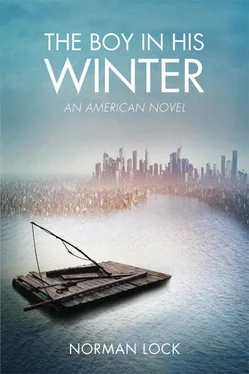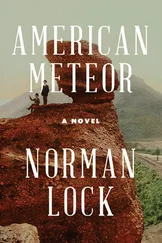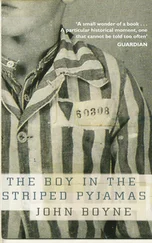“Will you have enough, Huck?” he asked.
“More than enough. And if I get hungry, I’ll cut a hole in the ice and fish.”
Jim took the food and a demijohn of whiskey and went into the trees. I did not see him again until spring thaw. I returned to the raft and prepared to wait for it beneath a canvas lean-to we’d set up earlier in our journey to keep off the sun.
Was I cold that bitter winter?
I can’t remember, though the broad river and the level ground thereabouts brought to mind a snow-covered steppe on which mastodons and Neanderthals harried one another in a remote, equally fantastic past. But surely it was intensely cold, whether Jim and I suffered from it or not. I saw a picture once, painted by Pieter Brueghel, of skaters on a lowlands river turned to ice. This was how it looked on the upper Mississippi in the winter of 1850, when people stepped out onto the frozen river to indulge a childlike wonder at the rarity of it all — their feet shod in iron blades wrought in the St. Genevieve blacksmith’s forge.
They paid no attention to me. I thought, at first, I was invisible; but they may have been indifferent in their jubilation and sport to a young ruffian on a raft. In any case, I thought it wise to let Jim be. The sight of a black man in that white emptiness might have diverted them from their pleasure, offering even finer sport than ice-skating. The winter had brought with its chill a kind of carnival abandon. Gray skies were grayer for the bright winter clothes, which were all the brighter for the somber atmosphere. Jim’s fresh blood sprawled on the much-abused ice would have been a colorful addition to the scene.
The winter seemed exceptionally long to me, who had scarcely noticed the passage of time. I thought the blockade of our raft could account for it. But I did not suffer hardship, except from an impatience to be going on with our journey, though we still had no idea of its destination. Nor did I suffer in the least from hunger during my wintering. I did make a hole in the ice beside the raft and fished for bullhead and carp, bass and pickerel to moderate my impatience, which may have been only a habitual nervousness. I was cursed with the jitters, unlike Tom Sawyer, whose ease and self-possession I’d always envied. I wondered what had become of him, now that he was getting older, according to calendars like the one in Aunt Polly’s kitchen, whose pages he’d already have plucked clean — eager, like any real boy, to escape the serfdom of childhood. The earth turned relentlessly on its axis for Tom, though not for me. (I had no inkling of the coming war, in which he’d play his part with dash, and Jim had not scried it in the bones. But God surely knew of it and would make certain that the ground — iron now with cold — would not deny the dead throngs their lasting rest.)
I must have slept. There was little else to do among the living while Jim hid. He’d found an abandoned ferryman’s shack and spent his days in speculation, his nights in tormenting himself with the recollection of his family, whose pain he transmuted into spirituals. They were tinged with gloom and bitterness, and I did not care for them. I preferred the comic songs of minstrels like the Ethiopian Serenaders I saw with Tom in Hannibal, having crept inside the tent one summer night. In April, the ice began to thaw, and Jim came out of the woods. I was happy to see him again, although I pretended unconcern.
“Winter’s over,” I said as he came aboard the raft, which, like me, was chaffing to resume the southward journey.
“Yes,” he said without adornment, the habit of conversation having broken.
A bird settled on the lean-to’s ridgepole: a crow, but not even that dire portent had power to move Jim to speech. His jaws were rusted shut by melancholy. I was glad of it, having grown accustomed to silence.
AT CAPE GIRARDEAU, on a bend of the Mississippi between St. Louis and Memphis, the river water, which had fattened with heavy rains in Nebraska and in Iowa, caught up to us. Thick brown ropes of water knotted all around the raft, but we went on, untouched by the upheaval. Around us, the weather was faultless. We lay on the rough deck, sunning ourselves. We might have fished up great whales from the bottom, so magical the day seemed, though the sky above the shore to either side of us was dark and solemn, as if that afternoon were the first Good Friday and we, two careless centurions throwing dice. We would not have known we were in the eye of a storm, surrounded everywhere by rising water, if not for trees, stumps, the walls and roofs of houses, and the bloated cows sweeping past us. That was 1851, the year of the Great Flood. (Another darkness, far ahead and far more terrible, waited downriver for me.)
Yes, I was still thirteen years old. I thought I’d made myself clear. I got on the raft with Jim when I was thirteen and got off for the last time — by myself, for Jim had perished — at the same age. One hundred and seventy years had gone, but I hadn’t changed, though my mind must have. All the long while when I was on the river with and then without Jim, I was living (if you can call it that) in mythic time. I know how hard it is to understand; it is nearly impossible for me to explain without resorting to Einstein’s general and specific theories of relativity, which I don’t understand any more than I understand slow light, time dilation, gravity wells, or black holes. One or another of them may account for the vast span of my existence. (I will not call it my life.) Maybe it has to do with time on a raft, which is slower than that onshore. While Jim and I dawdled our way south, fishing and telling tales, the world on dry land kept another sort of time: that of factories and businesses, of railroads and governments. Jim and I had not so much as a fat gold watch between us. Maybe we were dreaming, after all.
No, we must have been awake — or what am I to make of the chicken coop that, caught in one of the river’s ravels, knocked against our raft? A marvel, an improbability maybe, but not a dream. And that was no dream chicken we ate aboard the raft, roasted over the driftwood fire we kept going in a galvanized washtub. Look, I have the wishbone, kept all these years in my tobacco pouch for luck and as proof against the creeping doubt we entertain concerning the truth of recollection. I agree that a wishbone is meager evidence for one who claims to have seen Halley’s Comet for the first time in 1835 and three times since!
“What do you believe in, Jim?”
“Luck, mostly.”
“Nothing else?”
“Bad luck.”
“What about the chicken?” I asked, scraping with my teeth the last morsels of savory flesh from the bone.
Jim shrugged, helplessly, as if the conundrums of the universe were too many and great to be explained by a mere man, free or slave.
“I have a theory,” I said.
He said nothing, having become inured to my theories, which were abundant and fanciful. My mind had grown agile in Tom Sawyer’s company, though not nearly so creative. Tom was a liar, mostly, while I hope to be truthful.
“I don’t think we are any longer in life,” I said.
“You mean we’re dead?”
I could see that the idea didn’t appeal to Jim, who looked around wildly, as if expecting to see a fraternity of ghosts or, at the very least, the yellow dog that had died in the schoolyard, chasing its tail and foaming at the mouth. Had Jim worried about the persistence of rabies in the afterlife of a dog, I’d have assured him that glory, however brief, would have purged it of distemper. But Jim said nothing on the subject.
“No, we ain’t dead.” (If we’d had this conversation, I was sure to have said ain’t. Even so illustrious a citizen as Judge Thatcher employed the vernacular on occasion.) “We’re cut off, like two flies trapped in amber.” (I might have said marmalade, but the meaning is the same.)
Читать дальше












